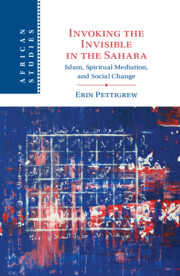Book contents
- Invoking the Invisible in the Sahara
- African Studies Series
- Invoking the Invisible in the Sahara
- Copyright page
- Epigraph
- Dedication
- Contents
- Illustrations
- Acknowledgments
- Notes on Orthography and Translation
- Abbreviations
- Introduction
- Part I Knowledge and Authority in Precolonial Contexts
- Part II Rupture, Consonance, and Innovation in Colonial and Postcolonial Mauritania
- 3 Colonial Logics of Islam
- 4 Postcolonial Transfigurations
- Part III Articulating Race, Gender, and Social Difference through the Esoteric Sciences
- Glossary
- Bibliography
- Index
- African Studies Series
3 - Colonial Logics of Islam
Managing the Threat of l’ḥjāb
from Part II - Rupture, Consonance, and Innovation in Colonial and Postcolonial Mauritania
Published online by Cambridge University Press: 19 January 2023
- Invoking the Invisible in the Sahara
- African Studies Series
- Invoking the Invisible in the Sahara
- Copyright page
- Epigraph
- Dedication
- Contents
- Illustrations
- Acknowledgments
- Notes on Orthography and Translation
- Abbreviations
- Introduction
- Part I Knowledge and Authority in Precolonial Contexts
- Part II Rupture, Consonance, and Innovation in Colonial and Postcolonial Mauritania
- 3 Colonial Logics of Islam
- 4 Postcolonial Transfigurations
- Part III Articulating Race, Gender, and Social Difference through the Esoteric Sciences
- Glossary
- Bibliography
- Index
- African Studies Series
Summary
This chapter argues that people in what became the French colonial territory of Mauritania marshalled l’ḥjāb in their opposition to colonization and how French perceptions of l’ḥjāb shaped their response to that opposition. It covers the first half of the colonial period from c.1900 when the French formally declared Mauritania a colonial military territory into the 1930s when France considered itself in military and administrative control of the colony. The chapter focuses on this period when colonizers first deployed a strategy of collaboration with certain religious leaders and then rapidly shifted to a strategy that restricted the physical movements of the men they called marabouts. These new restrictions on the movement and activity of purveyors of Islamic learning and its sciences targeted l’ḥjāb as a Mauritania-specific factor in broader colonial anxiety over Islam. It is during this period from 1900–1935 that the French established the policies that would directly shape their engagement with l’ḥjāb and, via socioeconomic changes that resulted from those policies, indirectly shape how people of Mauritania relied on l’ḥjāb and its practitioners.
- Type
- Chapter
- Information
- Invoking the Invisible in the SaharaIslam, Spiritual Mediation, and Social Change, pp. 109 - 155Publisher: Cambridge University PressPrint publication year: 2023

